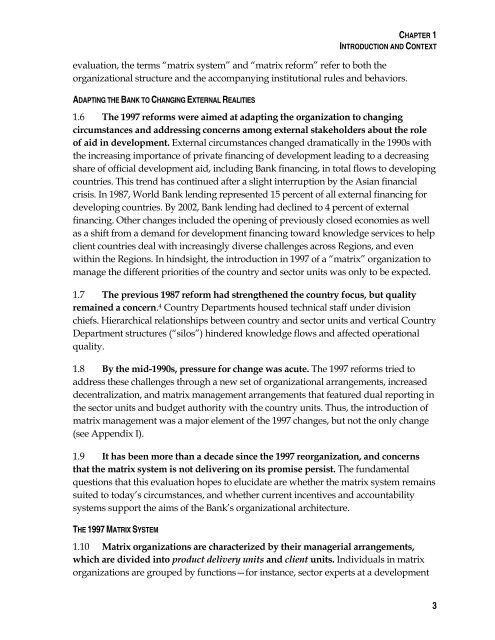The Matrix System at Work - Independent Evaluation Group - World ...
The Matrix System at Work - Independent Evaluation Group - World ...
The Matrix System at Work - Independent Evaluation Group - World ...
Create successful ePaper yourself
Turn your PDF publications into a flip-book with our unique Google optimized e-Paper software.
CHAPTER 1<br />
INTRODUCTION AND CONTEXT<br />
evalu<strong>at</strong>ion, the terms “m<strong>at</strong>rix system” and “m<strong>at</strong>rix reform” refer to both the<br />
organiz<strong>at</strong>ional structure and the accompanying institutional rules and behaviors.<br />
ADAPTING THE BANK TO CHANGING EXTERNAL REALITIES<br />
1.6 <strong>The</strong> 1997 reforms were aimed <strong>at</strong> adapting the organiz<strong>at</strong>ion to changing<br />
circumstances and addressing concerns among external stakeholders about the role<br />
of aid in development. External circumstances changed dram<strong>at</strong>ically in the 1990s with<br />
the increasing importance of priv<strong>at</strong>e financing of development leading to a decreasing<br />
share of official development aid, including Bank financing, in total flows to developing<br />
countries. This trend has continued after a slight interruption by the Asian financial<br />
crisis. In 1987, <strong>World</strong> Bank lending represented 15 percent of all external financing for<br />
developing countries. By 2002, Bank lending had declined to 4 percent of external<br />
financing. Other changes included the opening of previously closed economies as well<br />
as a shift from a demand for development financing toward knowledge services to help<br />
client countries deal with increasingly diverse challenges across Regions, and even<br />
within the Regions. In hindsight, the introduction in 1997 of a “m<strong>at</strong>rix” organiz<strong>at</strong>ion to<br />
manage the different priorities of the country and sector units was only to be expected.<br />
1.7 <strong>The</strong> previous 1987 reform had strengthened the country focus, but quality<br />
remained a concern. 4 Country Departments housed technical staff under division<br />
chiefs. Hierarchical rel<strong>at</strong>ionships between country and sector units and vertical Country<br />
Department structures (“silos”) hindered knowledge flows and affected oper<strong>at</strong>ional<br />
quality.<br />
1.8 By the mid-1990s, pressure for change was acute. <strong>The</strong> 1997 reforms tried to<br />
address these challenges through a new set of organiz<strong>at</strong>ional arrangements, increased<br />
decentraliz<strong>at</strong>ion, and m<strong>at</strong>rix management arrangements th<strong>at</strong> fe<strong>at</strong>ured dual reporting in<br />
the sector units and budget authority with the country units. Thus, the introduction of<br />
m<strong>at</strong>rix management was a major element of the 1997 changes, but not the only change<br />
(see Appendix I).<br />
1.9 It has been more than a decade since the 1997 reorganiz<strong>at</strong>ion, and concerns<br />
th<strong>at</strong> the m<strong>at</strong>rix system is not delivering on its promise persist. <strong>The</strong> fundamental<br />
questions th<strong>at</strong> this evalu<strong>at</strong>ion hopes to elucid<strong>at</strong>e are whether the m<strong>at</strong>rix system remains<br />
suited to today’s circumstances, and whether current incentives and accountability<br />
systems support the aims of the Bank’s organiz<strong>at</strong>ional architecture.<br />
THE 1997 MATRIX SYSTEM<br />
1.10 <strong>M<strong>at</strong>rix</strong> organiz<strong>at</strong>ions are characterized by their managerial arrangements,<br />
which are divided into product delivery units and client units. Individuals in m<strong>at</strong>rix<br />
organiz<strong>at</strong>ions are grouped by functions—for instance, sector experts <strong>at</strong> a development<br />
3

















